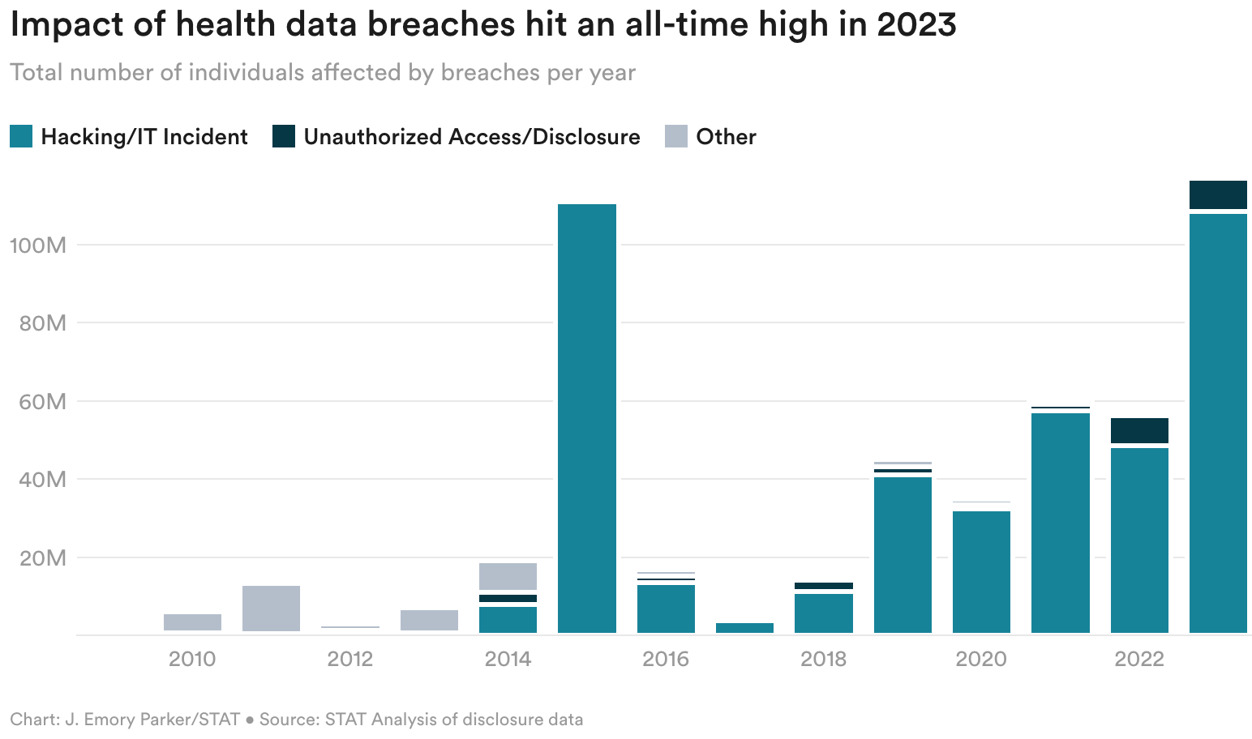health tech
Health data breaches set a record this year
"We're writing to inform you of a cybersecurity incident": If you've gotten a message like this from your health care organization, you're not alone. As many as 116 million people were hit by large health data breaches this year, according to records from the HHS Office for Civil Rights as of December 21. That's more than double recent counts, mostly spurred by a surge in hacking and ransomware attacks on health care groups regulated by HIPAA.
The last record enshrined on the office's "wall of shame" was set in 2015, when three data breaches at health plans Anthem, Premera Blue Cross, and Excellus affected tens of millions of patients each. This year, breaches and hacks were more scattered. Between 2018 and 2022, large breaches involving ransomware increased 278%. STAT's Katie Palmer has more dismal details, plus insights into the use of third-party tracking technologies. Read more.
health inequity
How structural racism impairs long-term health
It's long been known that Black, Hispanic, and Indigenous people in the U.S. have higher rates of chronic disease. A study published yesterday in JAMA Network Open ties those health disparities to structural racism — discriminatory policies in housing, education, employment, and criminal justice, STAT's Usha Lee McFarling tells us. "These systems cascade into discriminatory beliefs, values, and the distribution of resources," said L. Ebony Boulware, the study's senior author and dean of the Wake Forest University School of Medicine.
In what is a budding area of research, scholars have been trying to understand just how policies such as redlining or policing practices, and their legacies of poverty, unemployment, and incarceration, work to impair long-term health. The study found that high rates of chronic kidney disease, diabetes, and hypertension were consistently associated with neighborhoods in Durham County, N.C., that had global measures of structural racism — low populations of white residents and high area deprivation, or socioeconomic disadvantage.
The study also looked at discrete measures of structural racism within neighborhoods — from violent crime, high eviction rates, low tree cover, and police shootings — and found a higher burden of chronic disease in neighborhoods with more of these issues. The study, said lead author Dinushika Mohottige of the Icahn School of Medicine at Mount Sinai, "helps us identify factors which might be targeted to address community health inequities."
reproductive health
The high cost of childbirth
Childbirth is expensive, and can lead to medical debt even among patients with insurance. New research in the upcoming issue of Obstetrics and Gynecology found that postpartum adults had higher rates of medical debt in collection compared to pregnant individuals, suggesting that the out-of-pocket expenses incurred during or after delivery were higher than they could afford. The study looked at 14,560 postpartum people and 12,157 pregnant people, all of whom had commercial insurance.
The issue is especially pronounced among people living in low-income neighborhoods, STAT's Annalisa Merelli tells us. Among that group, those who were postpartum had a nearly 30% predicted probability of having medical debt in collection — a percentage nearly twice as high as those in higher-income neighborhoods. This, the authors write, points to the need for policies that reduce maternal and infant spending, especially in order to mitigate inequities.


No comments